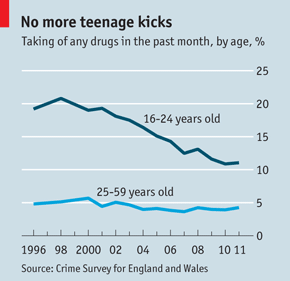Why young Britons have turned responsible

“I HOPE I die before I get old”—so sang Roger Daltrey of The Who in 1965. A new concept was then sweeping Britain: the “teenager”. Liberated by high wages and new types of contraception, young people started a sexual and social revolution. Mods and rockers fought at the seaside. Now, it seems, the change they wrought is being undone. Despite the images of teenage looters beamed across the world during last year’s riots, young people in Britain are broadly, and increasingly, well-behaved. Unlike Mr Daltrey, they appear to want to get old before they die.
Youthful continence shows up in all manner of social indicators. In 1998 fully 71% of 16- to 24-year-olds admitted drinking in the previous week. In 2010 just 48% did. The decline in drug-taking is even sharper (see chart). Teenage pregnancies are down by a quarter since 1998, to the lowest level since 1969. School-truancy rates have fallen since 2007, along with levels of youthful criminality. Young people have even become more polite: according to the Offending, Crime and Justice Survey, people born between 1992 and 1996 are less frequently rude and noisy in public places than were previous cohorts at the same age.
“It’s no longer all sex, drugs and rock and roll,” says Christian Kurz, a vice president at Viacom, which runs MTV, a television network aimed mostly at young audiences. To attract viewers from the “millennial” generation, MTV has replaced the glamour-driven programmes of the past with grittier ones such as “Teen Mom”, which emphasises family and responsibility. Millennials in Britain and elsewhere want reality rather than fantasy, explains Mr Kurz. This extends to what they buy: above all else, brands must appear to be “authentic” if they want to succeed, says Rodney Collins, a director at McCann, an advertising firm.
Whatever has happened to carefree youth? Public-health campaigns, better education and more hands-on parenting have no doubt had some effect. Some young people are probably staying inside watching television and playing video games instead of smoking behind the bike sheds. And Britain’s population is changing. The proportion of 15- to 24-year-olds who identify themselves as “white British” has fallen slightly in the past decade, to about 80%. Among the groups filling the gap are British Pakistanis and Bangladeshis, who are less likely to drink or take drugs than their white peers.
Just as important, young people have less money with which to indulge their hedonistic instincts (see article). Far fewer young people work than did ten years ago, because of the economic slump and the expansion of higher education. Many more of them live with their parents. Even those who do have jobs tend to earn less than they used to. Between 1997 and 2011 the average weekly wage earned by 18- to 21-year-olds declined by one-tenth in real terms. It is considerably harder to be rebellious if you have no money and live in your childhood bedroom.
Perhaps most interesting is what has not happened. The collapse in marriage rates and the rise of single-parenthood, both of which continued well into the 1990s when today’s young adults were born, might have been expected to unleash a wave of social problems. As it turns out, if there has been an effect, it has been outweighed by bigger, more benevolent forces. For politicians worried about the breakdown of the traditional family model, that ought to be reassuring. For rock music fans, it may be less so.


 Votes : 0
Votes : 0









